'If you’re trying to keep people happy, then you’re just a politician': Cork Bishop says Church values are perennial
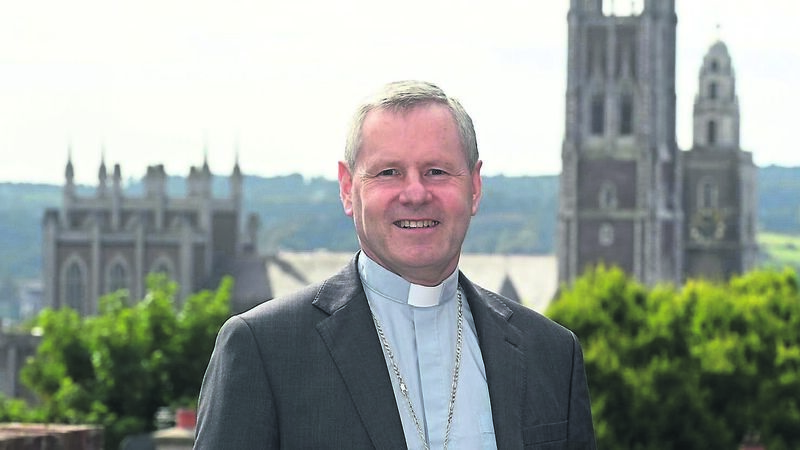
Bishop Fintan Gavin, Bishop of Cork and Ross.
WHEN Bishop Fintan Gavin arrived in Cork, one politician, whom he won’t name on the record, suggested to him that it must be difficult to try and please everyone in the diocese.
“I said to them, ‘That’s not how I would see my role. Our values are perennial, in season, out of season, and I’m not trying to get votes’,” he told The Echo over coffee in the diocesan office off Redemption Road.
“In season, out of season, you have to try and preach your message, and it’s not always going to be popular, and I’m learning that the more I get into this job, as you try and evoke change for what you believe is for the Gospel, for what you were called here to be.
“If you’re just trying to keep people happy, then you’re only a politician.”
The soft-spoken Dubliner has been bishop of Cork and Ross for three years, with most of that time dominated by the Covid-19 pandemic. When asked what he has done that might be described as unpopular, he mentioned the families of parishes innovation, which has seen a radical shake-up of the diocese, with priests operating across groups of parishes.
“The challenges of the families of parishes, it was the culmination of three years of work for me, no one said it was going to be easy, but the priests have all been on board, and now we need to start working it, how do you work as a team, how do you broaden it?
“We can’t keep going with all the churches that we have, how do you decide where Mass is on a Sunday, and if we believe that it’s gathering people together, how do you bring them together, rather than having a splinter group here and there and Father rushing in his car from one to the other?”
He added that implementation of the family of parishes model would be where “rubber meets road”, saying that it would be in practical decisions that difficulties would become apparent.
'WHAT IS THE CHURCH FOR?'
“I think everyone understands it until there won’t be a Mass here, ‘We always had a baptism here and all our children were baptised here, in this particular church’. You could keep that system going for another few years, tipping around, but what is the Church for? It’s not about just keeping churches for the sake of it.
“Churches are there as places of worship, for people to gather, and it’s about bringing people together to have good, vibrant, liturgies where there’s participation of people, where there’s a sense of energy and life, where we can see the Gospel proclaimed and then taken out into people’s lives. You won’t do that if you just try to maintain a system that was there for a different time, when there was a lot more priests and a lot more people there.”
Bishop Gavin said he completely understood the sense of identification that parishioners have with their local churches and wanted to emphasise that there was no intention to close churches.
“Part of what we’re trying to do with the families of parishes is to get people to work across the parishes, we’re not closing churches, but will there be a Sunday Mass in every church? There won’t, but they will be open for personal prayer, for a funeral, say, on occasion, but not on a regular basis.
“Some people would want you to work in a rotation basis, but that doesn’t allow for good community, unfortunately.”
The recent, high profile historical child sexual abuse case involving the Spiritans, the former Holy Ghost Fathers, was deeply shocking to many people in Ireland, and Bishop Gavin, who has worked with abuse survivors in the past, felt it should come as a reminder to all aspects of society of the need to protect vulnerable children and adults.
'WAKE UP CALL'
“I think it should serve as a wake-up call to us all to make sure that we keep our standards very high when it comes to safeguarding for children and vulnerable adults. We need to ensure that there is training, and that safeguards are in place.
“I would encourage anybody who has suffered in the past any kind of abuse to come forward and get the kind of support they need. We all have a responsibility, and it will be a legacy issue, and as bishops, it’s our job to make sure that abuse doesn’t happen again, but we can’t just say ‘That’s done and it’s gone’, because that’s not the nature of abuse.”
He said he felt Irish society has become a place more willing now to listen to abuse survivors, but he warned that we all have a duty toward vigilance.
“I think survivors, people who have been abused, are listened to now in a way they weren’t in the past, and I do think there’s an openness and an awareness, but I do think that, human nature being what it is, we can never become complacent.”
Ireland has seen an influx of some 60,000 Ukrainian people since Russia illegally invaded in February, and this has coincided with record numbers seeking international protection here, leading, in the midst of a housing emergency, to tensions and fears which have been exploited in some places by far-right anti-refugee extremists.
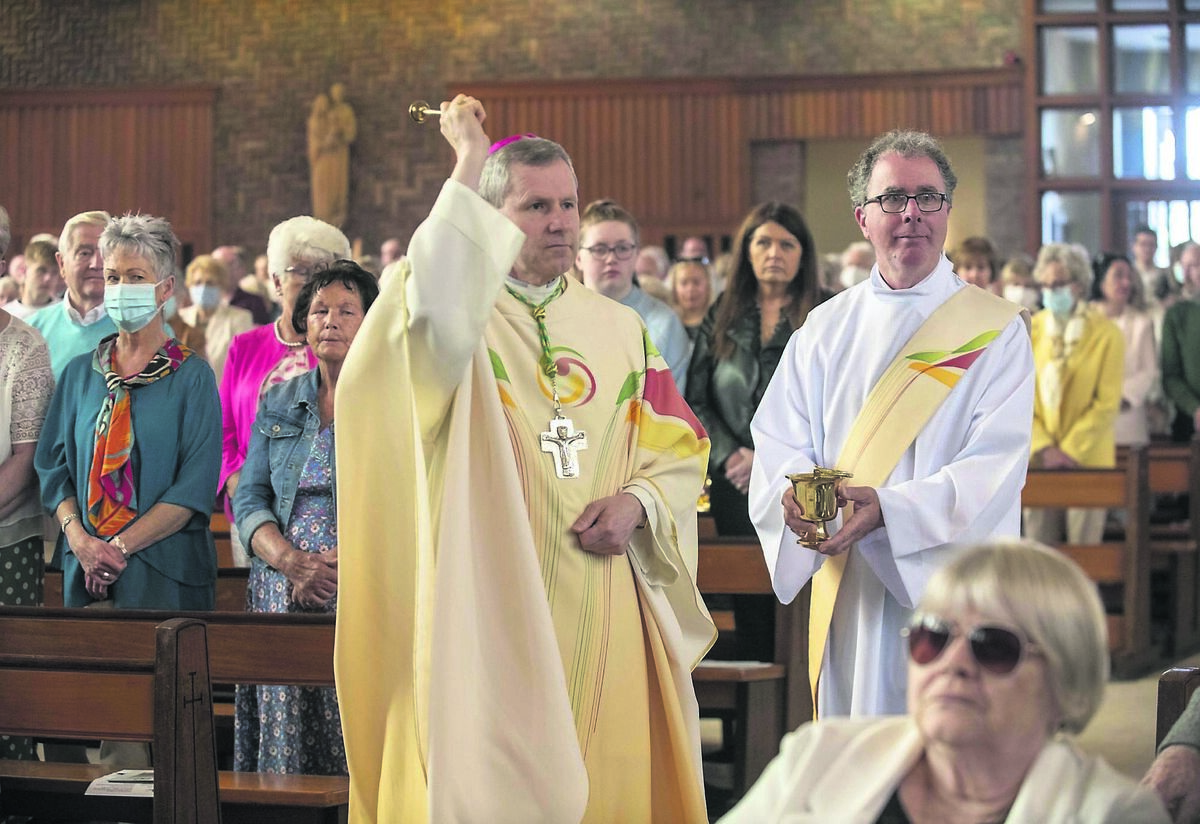
“If you go back to the Christmas story, in fact it was a displaced family who were looking for somewhere to stay,” the bishop said. Referring to his own recent Christmas message to schools in the diocese, he said Glanmire schoolchildren had asked him about Christmas, and he recalled one child’s questions about the inn-keeper who had welcomed Jesus’s family to his stable (see panel).
“This inn-keeper felt sorry for them, and even though his own inn was full, he put them in the stable, and there was a lesson there for all of us. There’s lots of displaced people today. We need to take a lead from the inn-keeper and open our homes and our hearts, and if we don’t do that, then in a sense we can’t celebrate Christmas.”
Bishop Gavin said he believes passionately in the Gospel message, feeling it is something “truly wholesome” to offer people in their lives.
“Despite the way we in the institution of the Church have messed it up at times, the message of Christmas, of Jesus Christ, for our community, for our society, for our city and for our county, that’s what we have to offer through our Church.
“That’s not to say there won’t be challenges but I really believe you have to have a vision and you have to keep that vision ahead of you, because you can get waylaid so easily,” he said.
“The aftermath of the terrible tragedy at Creeslough was an example of the good that faith can do, and we had it last week too in Killeagh, where the local community gathered and were supported by the faith community, and that just reminds us of our Christian story and reminds us that we’re there to support one another.”
Today the bishop will join a Ukrainian priest, whose family has moved to Ireland, for a special Mass for all of Cork’s Ukrainian community. Bishop Gavin will join Father Roman Biletskyy, a priest of the Byzantine Rite, which is also known as the Greek Catholic Church, for a Christmas celebration at 4pm on Christmas Eve in the Church of the Incarnation in Frankfield.
“Fr Roman will be celebrating Mass regularly here in the diocese, and I’m going to join him in Frankfield,” Bishop Gavin told The Echo. “We’ve also invited the Lord Mayor, and it’s just so tragic that so many Ukrainian people away from home for Christmas, and anyone who wants to join us is welcome at the Mass.
“Fr Roman will celebrate a Greek Catholic Mass, and to all intents and purposes it will be the same Mass that will be in the Orthodox Church, and in our own tradition we welcome them to the Eucharist as well,” the bishop said.
Fr Biletskyy arrived in Ireland in April with his wife Dahlia and their six children, and they have been given a home by the Roman Catholic parish in Fermoy.
The family moved into the former convent of the Little Company of Mary, known affectionately in Fermoy as “the Blue Nuns”, which had been renovated to accommodate refugees fleeing the Russian invasion of Ukraine.
The Byzantine Rite is in communion with Rome, and recognises Pope Francis as its supreme pontiff, but unlike their Roman Catholic brethren, Greek Catholic priests are allowed to marry and to have families.
“Our oldest child is 15, and the youngest one year and two months,” Fr Biletskyy told The Echo in April. “We have six children, almost a football team.”
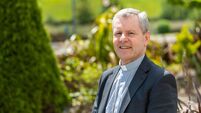
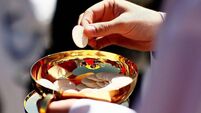
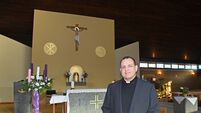







 App?
App?


